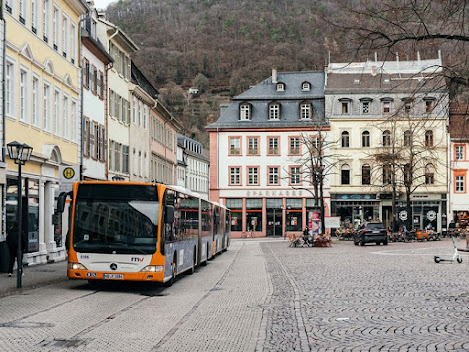EIDELBERG - Germany : Freeing the street of cars. The city even wants to reduce reliance on electric vehicles.
Eckwart Wurzner, a mayor on a mission to make his city-emission free, is not terribly impressed by promises from General Motors, Ford and other big automakers to swear off fossil fuels.
Not that Mr. Wurzner, the Mayor of Heidelberg, is against electric cars. The postcard perfect city, in southern Germany, gives residents who buy a battery powered vehicle a bonus of up to 1,000 euros, or $ 1,200. They get another Euro 1,000 if they install a charging station.
But electric cars are low on the list of tools that Mr. Wurzner, is suing to try to cut Heidelberg's impact on the climate, an effort that has given the city, home to German's oldest university and an 800-year-old castle ruin, a reputation as a pioneer in environmentally conscious urban planning.
Mr. Wurzner's goal is to reduce dependence on cars, no matter where they get their juice.
Heidelberg is buying a fleet of hydrogen-powered buses, building a network of bicycle ''superhighways'' to the suburbs and designing neighborhoods to discourage all vehicles and encourage walking.
Residents who give up their cars get to ride the public transportation free for a year.
''If you need a car, use car sharing,'' Mr. Wurzner said in an interview at Heidelberg's Baroque-style City Hall, which was nearly deserted because of the pandemic.
''If you can't use car sharing because you're living too far outside and there is no mass transportation, then use the car, but just to the train station and not to downtown.''
Heidelberg is at the forefront of a movement that is probably strongest in Europe but is present in communities around the world, including American cities like Austin, Texas, and Portland, Ore.
The pandemic has given many cities a taste of what densely packed urban areas would be like without so much traffic, and they like.
Vows of fossil fuel abstinence last month by carmakers, including G.M., Ford Motor and Jaguar Land Rover, are a tacit admission that they will no longer be welcome in cities at all unless they radically clean up their acts.
Even then, the tide of history may be against them, as urban planners try to free up space now occupied by vehicles.
Dozens of cities in Europe, including Rome, London, and Paris, plan to limit center city traffic to emission-free vehicles during the next decade. Some like Stockholm and Stuttgart, the German home of Mercedes-Benz already ban older diesel vehicles.
National governments are adding to pressure, Ireland, the Netherlands, Sweden, Slovenia say they will ban sales of internal combustion cars after 2030. Britain and Denmark say they will do so in 2035, allowing only hybrids after 2030, and Spain and France in 2040.
The Publishing continues to Part 2. The World Students Society thanks author Jack Ewing.

.png)


0 comments:
Post a Comment
Grace A Comment!